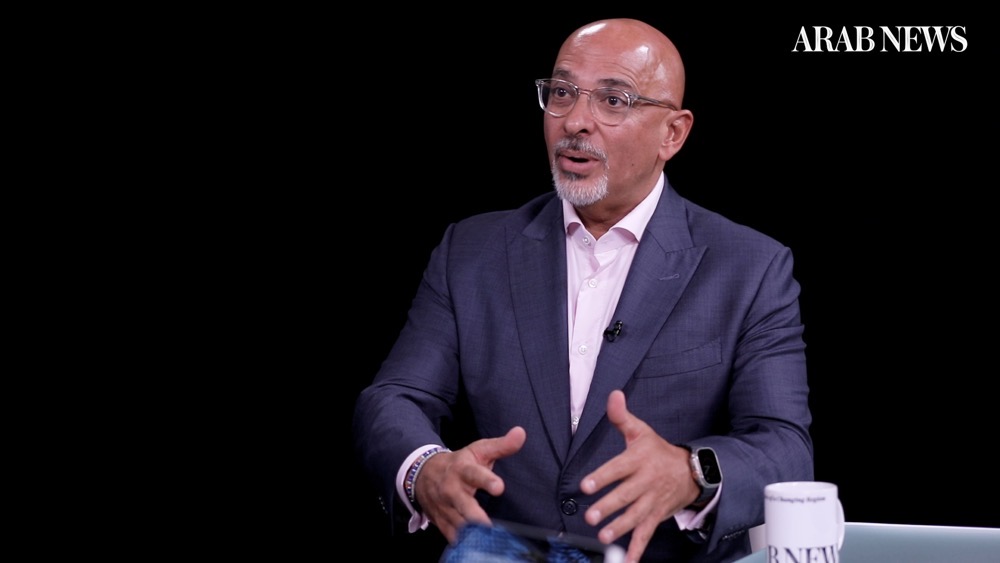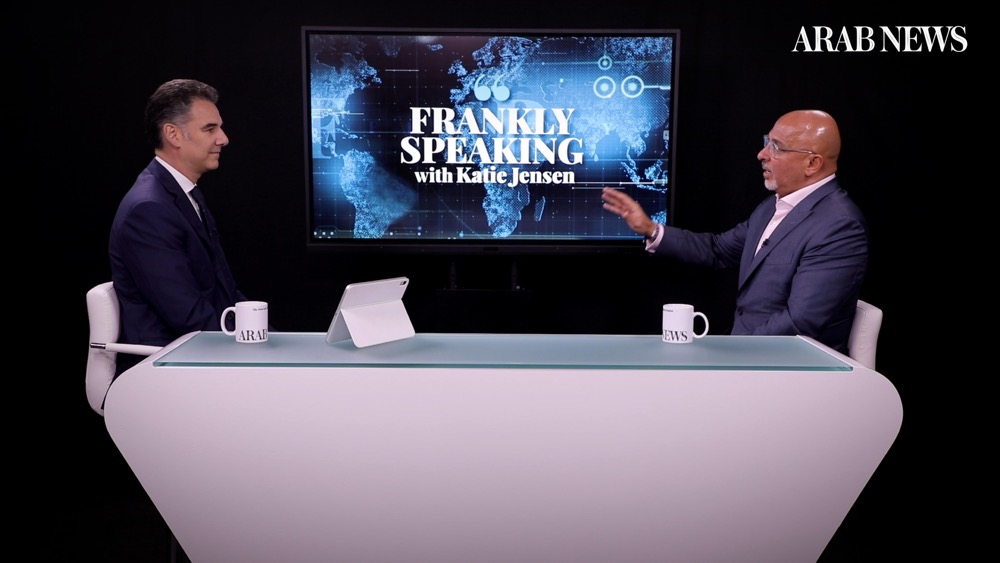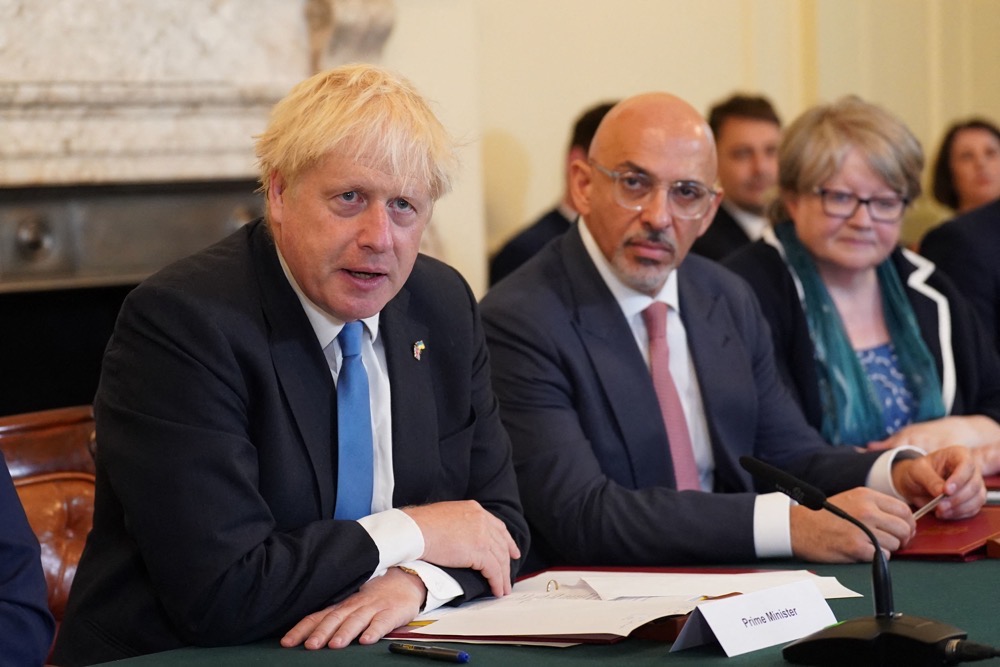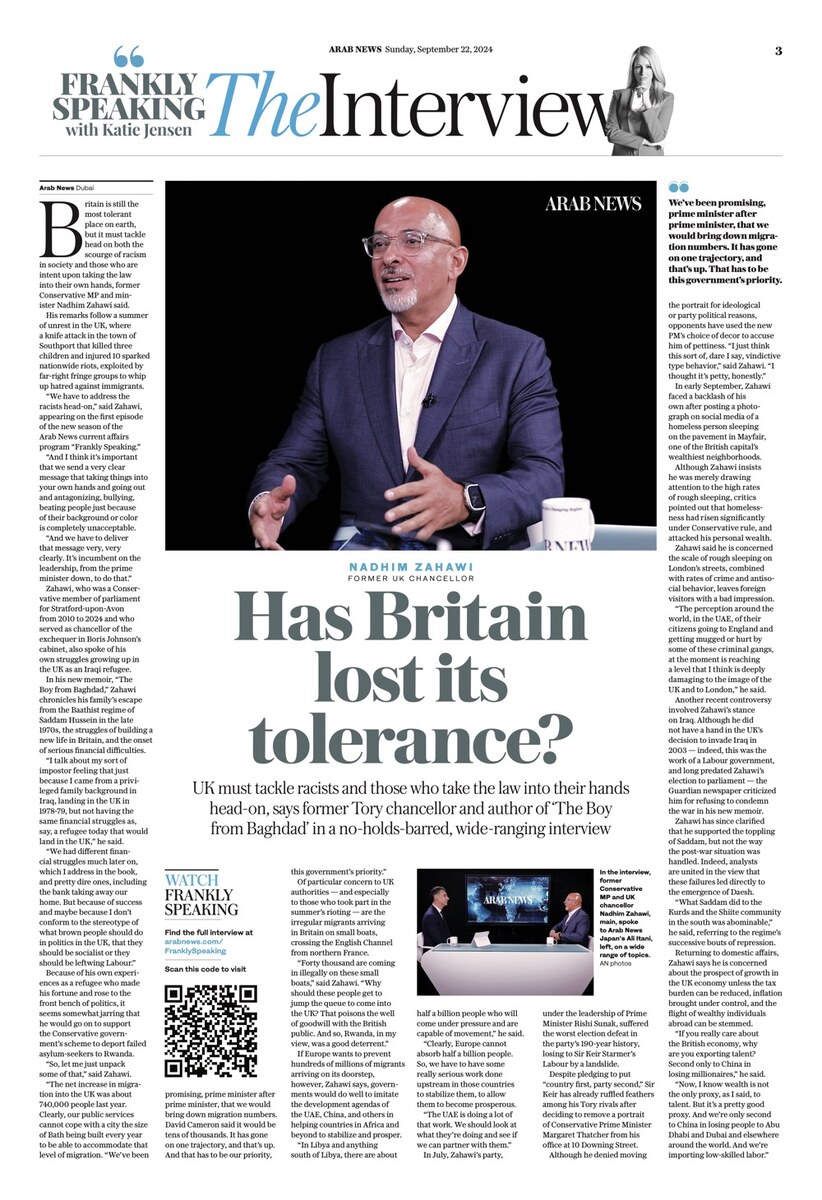DUBAI: Britain is still the most tolerant place on earth, but it must tackle head on both the scourge of racism in society and those who are intent upon taking the law into their own hands, former Conservative MP and minister Nadhim Zahawi said.
His remarks follow a summer of unrest in the UK, where a knife attack in the town of Southport that killed three children and injured 10 sparked nationwide riots, exploited by far-right fringe groups to whip up hatred against immigrants.
“We have to address the racists head-on,” said Zahawi, appearing on the first episode of the new season of the Arab News current affairs program “Frankly Speaking.”
“And I think it’s important that we send a very clear message that taking things into your own hands and going out and antagonizing, bullying, beating people just because of their background or color is completely unacceptable.
“And we have to deliver that message very, very clearly. It’s incumbent on the leadership, from the prime minister down, to do that.”

In his new memoir, “The Boy from Baghdad,” Zahawi chronicles his family’s escape from the regime of Saddam Hussein in the 1970s. (Arab News photo)
Zahawi, who was a Conservative member of parliament for Stratford-upon-Avon from 2010 to 2024 and who served as chancellor of the exchequer in Boris Johnson’s cabinet, also spoke of his own struggles growing up in the UK as an Iraqi refugee.
In his new memoir, “The Boy from Baghdad,” Zahawi chronicles his family’s escape from the Baathist regime of Saddam Hussein in the late 1970s, the struggles of building a new life in Britain, and the onset of serious financial difficulties.
“I talk about my sort of impostor feeling that just because I came from a privileged family background in Iraq, landing in the UK in 1978-79, but not having the same financial struggles as, say, a refugee today that would land in the UK,” he said.
“We had different financial struggles much later on, which I address in the book, and pretty dire ones, including the bank taking away our home. But because of success and maybe because I don’t conform to the stereotype of what brown people should do in politics in the UK, that they should be socialist or they should be leftwing Labour.”
Indeed, Zahawi also had to contend with racial discrimination. Does he believe Britain has always had a racism problem?

A knife attack in the town of Southport that killed three children sparked riots nationwide. (AFP)
“In the 1980s, it was very different to today, including my own party,” he said. “I think the Conservative Party of the ’80s was a bit of a closed shop for people of my background, but I persevered.
“There are always going to be elements of racism. But I think, if you look at the evidence, the UK has dealt with it in a much better way than pretty much every other country around us in Europe.”
Because of his own experiences as a refugee who made his fortune and rose to the front bench of politics, it seems somewhat jarring that he would go on to support the Conservative government’s scheme to deport failed asylum-seekers to Rwanda.
“So, let me just unpack some of that,” said Zahawi.
“The net increase in migration into the UK was about 740,000 people last year. Clearly, our public services cannot cope with a city the size of Bath being built every year to be able to accommodate that level of migration.
“We’ve been promising, prime minister after prime minister, that we would bring down migration numbers. David Cameron said it would be tens of thousands. It has gone on one trajectory, and that’s up. And that has to be our priority, this government’s priority.”
Of particular concern to UK authorities — and especially to those who took part in the summer’s rioting — are the irregular migrants arriving in Britain on small boats, crossing the English Channel from northern France.
“Forty thousand are coming in illegally on these small boats,” said Zahawi. “Now, the problem with that is ... the unfairness of that, the perception that this is really bad, it’s unfair. Why should these people get to jump the queue to come into the UK? That poisons the well of goodwill with the British public. And so, Rwanda, in my view, was a good deterrent.”

King Charles paying tribute to the victims in Southport. (AFP)
Owing to repeated defeats in the UK’s highest courts over its human rights implications, the Rwanda scheme never got off the ground, and was immediately scrapped by the new Labour administration, which has pledged to tackle the smuggling gangs at the source.
If Europe wants to prevent hundreds of millions of migrants arriving on its doorstep, however, Zahawi says governments would do well to imitate the development agendas of the UAE, China, and others in helping countries in Africa and beyond to stabilize and prosper.
“In Libya and anything south of Libya, there are about half a billion people who will come under pressure and are capable of movement for political reasons, for environmental reasons, or economic reasons,” he said.
“Clearly, Europe cannot absorb half a billion people. So, we have to have some really serious work done upstream in those countries to stabilize them, to allow them to become prosperous.
“The UAE is doing a lot of that work. We should look at what they’re doing and see if we can partner with them, because the work they’re doing in Africa is second only to China and the investment China is making in Africa.”
In July, Zahawi’s party, under the leadership of Prime Minister Rishi Sunak, suffered the worst election defeat in the party’s 190-year history, losing to Sir Keir Starmer’s Labour by a landslide.

Of particular concern to UK authorities are the irregular migrants arriving in Britain on small boats. (AFP)
Despite pledging to put “country first, party second,” Sir Keir has already ruffled feathers among his Tory rivals after deciding to remove a portrait of Conservative Prime Minister Margaret Thatcher from his office at 10 Downing Street.
Although he denied moving the portrait for ideological or party political reasons, opponents have used the new PM’s choice of decor to accuse him of pettiness. “I just think this sort of, dare I say, vindictive type behavior,” said Zahawi. “I thought it’s petty, honestly.”
In early September, Zahawi faced a backlash of his own after posting a photograph on social media of a homeless person sleeping on the pavement in Mayfair, one of the British capital’s wealthiest neighborhoods.
Although Zahawi insists he was merely drawing attention to the high rates of rough sleeping, critics pointed out that homelessness had risen significantly under Conservative rule, and attacked Zahawi’s personal wealth.
“I just happened to be walking through Hertford Street, and I saw this poor, tragic human being lying on the pavement in the morning, and I wanted to highlight that this really is an issue. And it’s heartbreaking,” said Zahawi.
“But then you’ve got the Twitter pile-on from the lefties, who then attack your success, as if I’m somehow affronted by this just because it happens to be Mayfair. No.”

Zahawi appeared on the first episode of the new season of the Arab News current affairs program “Frankly Speaking.”
Zahawi says he is concerned the scale of rough sleeping on London’s streets, combined with rates of crime and antisocial behavior, leaves foreign visitors with a bad impression.
“The perception around the world, in the UAE, of their citizens going to England and getting mugged or hurt by some of these criminal gangs, at the moment is reaching a level that I think is deeply damaging to the image of the UK and to London,” he said.
Another recent controversy involved Zahawi’s stance on Iraq. Although he did not have a hand in the UK’s decision to invade Iraq in 2003 — indeed, this was the work of a Labour government, and long predated Zahawi’s election to parliament — the Guardian newspaper criticized him for refusing to condemn the war in his new memoir.
Zahawi has since clarified that he supported the toppling of Saddam, but not the way the post-war situation was handled. Indeed, analysts are united in the view that these failures led directly to the emergence of Daesh.
“What Saddam did to the Kurds and the Shiite community in the south was abominable,” he said, referring to the regime’s successive bouts of repression.
“It was murderous. It was criminal. The Anfal program alone is responsible for 182,000 innocent souls being murdered, 4,000 Kurdish villages burnt to the ground. And so I think it’s only right that the world helped these unfortunate souls, these communities, depose such an evil tyrant.
“Post war, I think actually we really made a terrible error of judgment. And I would very easily explain to those interested that I think Tony Blair should have been much more robust to our most important ally, the US, by saying, look, show me the plan.”

Britain is still the most tolerant place on earth, Zahawi told Arab News. (AFP)
He highlighted the de-Baathification campaign and the disbanding of the Iraqi army as particularly grave errors that sparked the extremist insurgency that followed.
“You send home 700,000 men with no hope of a job, no way to put food on the table, and a gun in their pocket. What do you think is going to happen? The end is Daesh. That was a terrible, terrible decision,” he said.
“It’s right to be able to almost disaggregate those two things and say, actually, the removal of an evil dictator was right. But we never really planned for the day after properly. And we have to take part of that responsibility in the UK.”
Returning to domestic affairs, Zahawi says he is concerned about the prospect of growth in the UK economy unless the tax burden can be reduced, inflation brought under control, and the flight of wealthy individuals abroad can be stemmed.
“If you really care about the British economy, why are you exporting talent? Second only to China in losing millionaires,” he said.
“Now, I know wealth is not the only proxy, as I said, to talent. But it’s a pretty good proxy. And we’re only second to China in losing people to Abu Dhabi and Dubai and elsewhere around the world. And we’re importing low-skilled labor.”
Having stood down ahead of the last general election, Zahawi is now free to return to his business ventures. One new acquisition he is said to be keen on is The Daily Telegraph — one of the Western world’s oldest conservative-leaning publications.
“It would be an honor and a privilege to lead a great newspaper like The Daily Telegraph and it is one of our great products,” he said.

Zahawi was a Conservative member of parliament for Stratford-upon-Avon from 2010 to 2024 and served as chancellor of the exchequer in Boris Johnson’s cabinet. (AFP)
The sale has met with controversy, however, after a UAE-backed bid to buy the paper was effectively blocked when the UK government published proposed laws banning foreign states or government officials from holding any direct stakes in newspaper assets.
Although he remains in the running to buy the paper, Zahawi feels the country was sending out the wrong signal. “The UK should always be open for business,” he said.
“The way you protect particular sectors of the economy, if they require protection, whether it’s nuclear or media, is through regulation, good regulation, not legislation.”


























